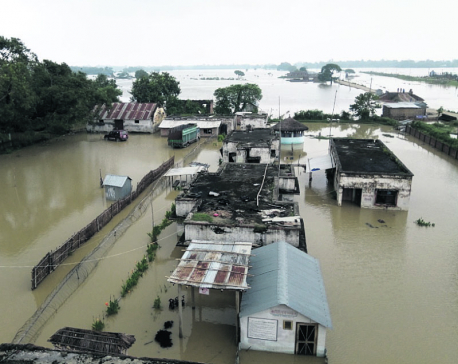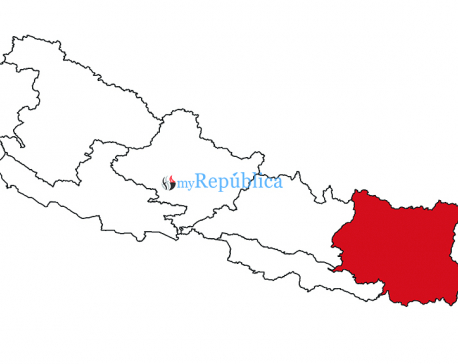
OR
Rs 1.86 billion program to address disability rolled out in Province 1
Published On: March 18, 2020 07:41 AM NPT By: SHREE RAM SUBEDI
KATHMANDU, March 18: In September last year, the Ministry of Social Development, Province 1 signed an agreement with Karuna Foundation, an NGO, to implement a Disability Prevention and Rehabilitation Program (DPRP). This 1.86 billion-rupee project is looking to develop disability-inclusive communities through community-based healthcare.
The provincial government, the local government and an NGO, Karuna Foundation Nepal are working together to prevent and rehabilitate people with disabilities. The NGO is also signing a separate agreement with local governments to implement the project in their respective municipalities.
With a total budget of Rs 1.86 billion, the six-year program seeks to support 100,000 people with disabilities in the province with access to care, education, income and social life. A total of 128,000 pregnant women are expected to get access to professional care in birthing centers every year. The aim is to reduce the risks of birth defects. One million children under the age of 10 are also targeted to prevent stunted growth and acquired disabilities.
Official figures suggest that nearly six percent of all children in Nepal are born with a disability and many children develop a disability in the first year of their life known as the first 1000 golden days. Nearly two percent of the total population of Nepal is reported to have some kind of disability, according to the national population census 2011.
People with disabilities have limited access to care, livelihood and are often excluded from social life in Nepal. “The co-funding and partnership model is unique from the perspective of sustainability, local level ownership and clear cut exit strategy,” Jiban Ghimire, minister for social development, province 1, said.
The program is spread over four phases and aims to cover all the 137 local governments of Province 1. “The partnership model is not just limited to a few years,” said R B Rai, the mayor of Suryodaya Municipality, Ilam, where the program is being implemented. “It is meant to sustain with the local ownership and the NGO’s exit strategy.”
As per the agreement, the foundation will implement the program in phases in the local units of all districts of Province 1 from 2019/20. In a span of four years, the program will be fully run by the local governments, under the direction and control of the provincial government.
The total cost of the program has been projected at Rs 1.86 billion and this will be borne equally by the three parties to the agreement. Each party need to deposit its share of fund in the consolidated funds of the local governments, while the local governments will be responsible for mobilization and auditing of the fund.
For the first two years, the program cost at each local level will be shared equally by the province, the local government and Karuna Foundation. And from the third year onward, the cost will be borne only by the provincial government and the municipalities. The local government and the NGO will work jointly to ensure that there is participation of target groups in each process and also be involved in problem identification, plan development, program implementation and monitoring and evaluation.
To monitor and supervise the program, there is a steering committee chaired by the minister of social development at the province level, while program management committees at the municipal and ward levels are headed by the mayors or chairs or deputy mayors or vice chairs and ward chairpersons. A separate “Implementation Guideline for Disability Prevention and Rehabilitation Program, 2076” is also in place, which specifies the role of each party in the tripartite partnership.
The program aims to increase access and utilization rates of maternal, infant and child health and nutrition services of all groups, to improve quality of lives of persons with disabilities and their families and provide support for strengthening the service provider organizations of the local governments.
The project aims to include technology (mobile phone), maternal, neonatal and child nutrition program, capacity building of health workers, school health program and awareness programs on maternal, neonatal and child health. The program also includes setting up at least one birthing centre with portable ultrasound machine and other basic necessities and one physiotherapy centre per municipality. Ensuring the consumption of folic acid tablets by both the couples once they plan to conceive a baby and after being pregnant by the mother is another key feature of the program, according to the officials.
“All types of disabilities in the province will be recorded, and we will have a comprehensive database of people with disability in Province 1,” argues Deepak Raj Sapkota, the executive director of Karuna Foundation. “It is not only cost sharing; the major thrust of the program is to strengthen current health institutions and community systems at the local level.”
Furthermore, the intervention seeks to strengthen the government and community systems to fulfill their mandates in line with the constitution and various other legal frameworks introduced by the government of Nepal. “It will contribute significantly to achieving the targets of Sustainable Development Goals (SDGs) and Multi-Sectoral Nutrition Plan (MSNP),” added Sapkota.
“Our Foundation will support the government by providing training, guidance, co-funding and support in the implementation to make sure the provincial government and municipalities involved can continue the program on their own after three years,” said Sapkota. He claimed that 19 percent of the total population of Province 1 will be covered by the program by 2022.
You May Like This

More than 300 homes inundated in Province 1
ITAHARI, July 4: Incessant rains in Province 1 have resulted into the inundation of more than 300 homes mainly in... Read More...

Corona death toll rises to 43 in Province 1
BIRATNAGAR, Sept 7: COVID-19 death toll is rising sharply in Province 1 with one more death reported in Morang district... Read More...

Province 1 passes public service commission bill
BIRATNAGAR, Aug 27: Province 1 assembly meeting on Tuesday unanimously passed a bill relating to the formation and operation of Province... Read More...



Just In
- World Malaria Day: Foreign returnees more susceptible to the vector-borne disease
- MoEST seeks EC’s help in identifying teachers linked to political parties
- 70 community and national forests affected by fire in Parbat till Wednesday
- NEPSE loses 3.24 points, while daily turnover inclines to Rs 2.36 billion
- Pak Embassy awards scholarships to 180 Nepali students
- President Paudel approves mobilization of army personnel for by-elections security
- Bhajang and Ilam by-elections: 69 polling stations classified as ‘highly sensitive’
- Karnali CM Kandel secures vote of confidence















Leave A Comment